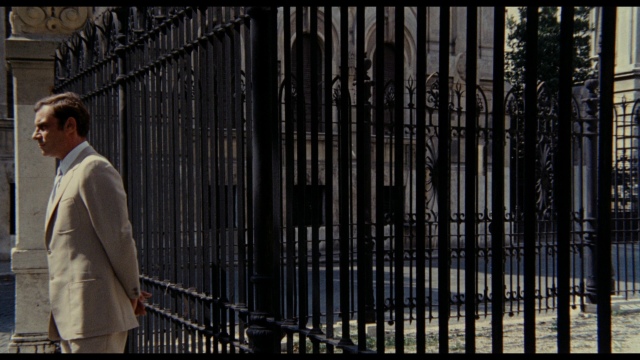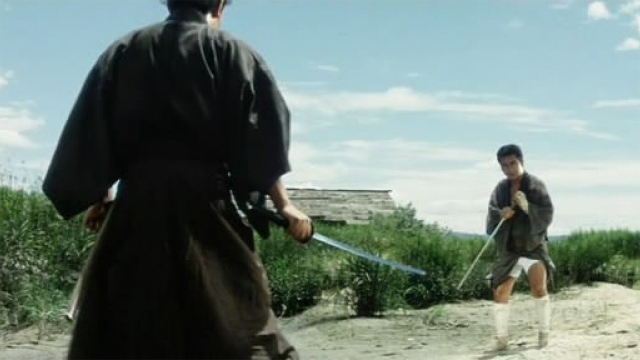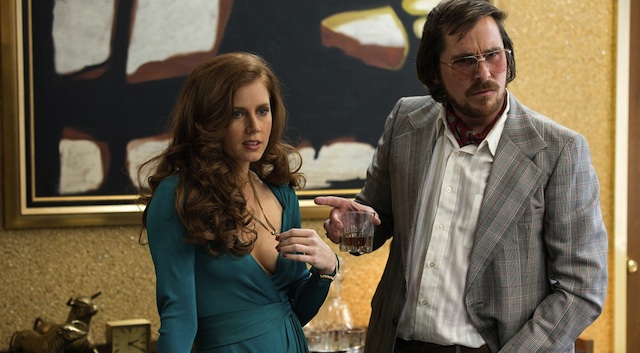 Investigation Of A Citizen Above Suspicion
Investigation Of A Citizen Above Suspicion
You ever look at a synopsis for a film you’ve never seen before and think to yourself, “It’s almost a guarantee that I’m going to love the hell out of this”? That kind of anticipation can be both a blessing and a curse. There have been times when I’ve gone into a film with enormously high expectations, and had them not only met but exceeded. But then there have been times when I’ve gone into a film with enormously high expectation, only to be left puzzled by my unexpectedly muted reaction. It’s not that the film is bad per se, it’s just that it didn’t quite connect in the way you were hoping. Such is the case with Investigation Of A Citizen Above Suspicion, the Elio Petri-directed Oscar winner from 1970. Gian Maria Volanté plays an unnamed police inspector, recently promoted from homicide to a more politically-oriented position. But we learn of his occupation only after the opening scene, which has him murdering his mistress in the heat of passion. Instead of combing over the crime scene to remove any evidence, however, he plants obvious clues to incriminate himself. When the investigators seem all too willing to overlook the obvious, he continues to steer their attention back to him, in an effort to see whether or not he is indeed “above suspicion.”
It’s a setup littered with promise, and Petri does everything he can to inject the film with as much energy as possible. The camera is constantly moving, an appropriate choice considering the restless nature of the inspector character, and the whole thing is supported by a jaunty, springy score from Ennio Morricone that sounds like it could have just as easily been in one of Sergio Leone’s classic westerns (the connection is heightened by the presence of Volanté, most recognizable for his villainous roles in the first two films of Leone’s “Man With No Name” trilogy). And yet, the film ends up feeling a little too reserved, a little too distant, to be completely involving. At least its message is a worthy one; Petri paints an unflattering picture of Italian bureaucracy, an authoritarian world where men of power and influence look after one another, even at the expense of those in less fortunate positions. The inspector’s actions eventually become something of a cry for help, a desperate revolt against the people who would dare promote him away from his comfortable existence. That political focus is the film’s main virtue; as a piece of drama, it just never quite shifts into high gear. 7/10.
The fourth film in the Zatoichi series. Following up the great New Tale Of Zatoichi, a film I found to be the highlight of the series so far, was always going to be a tough task. So it doesn’t come as much surprise to discover that, with one notable exception, this entry falls a little short of the consistently high quality its predecessor and the other early films display. As is customary, Zatoichi The Fugitive opens with the blind swordsman traveling alone through the Japanese countryside. But there’s rarely a dull moment in the life of the deadly masseur, and soon enough he is standing over his fallen enemies and listening to the wishes of a dying man. His leads him to a nearby village, where once again he finds himself caught in the middle of a troublesome and deadly rivalry. But even more troublesome is the return of his old flame Otane (Masayo Banri, reprising her love interest role from the first two films).
The presence of Otane is in a way emblematic of the film’s overall sense of complacency. The character is there to inject some deeper significance into what is otherwise a quite routine story, but she never seems like anything more than a convenient narrative device, even with some brief musings on how the character has become a much different kind of woman since the last time she and Zatoichi crossed paths. This angle isn’t given much more than a cursory exploration though. She exists as a placeholder, which is as good a description as any for the film itself. Now, I did mention an exception earlier. The final stretch is absolutely phenomenal, an extended showdown where allegiances are tested, true natures are revealed, and much blood is spilled. The body count remained relatively low throughout the first three films, but that absence of carnage is corrected in the concluding 20 minutes of Zatoichi The Fugitive. It’s riveting, and almost redeems the lack of interesting material preceding it. I doubt I’ll remember much of anything related to the early sections of the film, but the rousing finish will hold a fond place in my memory. 6/10.
In his own unique way, David O. Russell has become one of the most interesting filmmakers currently working today. I say “in his own unique way” because he tends to operate differently than most of the so-called “auteurs” of this generation, making his mark through character and script moreso than visual panache. Not to say he doesn’t have a good cinematic eye, but as a visual stylist, he’s more of a chameleon, shaping his style depending on the type of material he’s filming. With his latest film, Russell repurposes the free-flowing camera and narrative tricks of ’90s era Martin Scorcese, with a little Robert Altman thrown in for good measure, for a con artist comedy/drama loosely based on the famous Abscam sting of the ’70s. At least in terms of subject matter, the material is a perfect fit for the eclectic filmmaker. Just as Russell seems to take on several different identities as a director, so too do the characters at the heart of American Hustle.
In less skilled hands, the constant evocations of Goodfellas– and Casino-era Scorcese would be a constant and irritating distraction. Russell gets away with it because of his offbeat brand of humor and playful approach (the opening title sequence, of the characters walking down a hallway to the sounds of Steely Dan’s ‘Dirty Work’ is among my favorite moments of the year). There’s a particular rhythm to his brand of comedy that you can never quite get a handle on, and it’s exhilarating to watch the actors (all of whom turn in terrific performances) diving into the material with gusto. Admittedly, the film does come across sometimes as too shambolic and aloof, and that creates some shortcomings; there isn’t much detail given to the central operation, and not much tension in how it all plays out. The actual con elements of this con caper are never the most interesting ones at play. But the film remains compulsively watchable in spite of its flaws, and I think it all comes back to Russell’s penchant for creating fascinating characters and memorable interactions between them. The film never stops having fun long enough to start taking itself too seriously, and I think that’s something to celebrate. 8/10.
Trailers/Clips:


